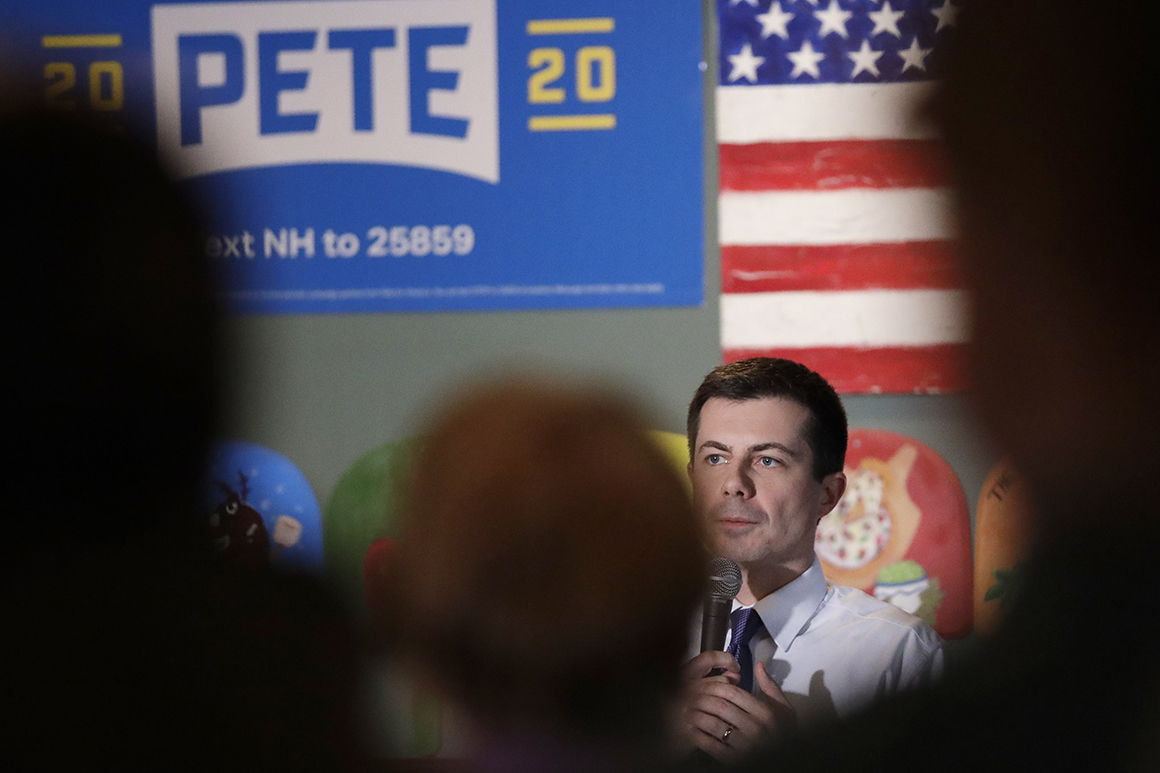
A new batch of votes was released late Tuesday, bringing the total proportion of precincts reporting to 71 percent. But the breakdown of state delegates remained nearly the same: Buttigieg was at just under 27 percent, Sanders at 25, Warren at 18, Biden at 15 and Klobuchar just under 13.
In remarks in Laconia, N.H. after the partial results were released, Buttigieg, the first openly gay man to run a viable campaign for president, teared up as he talked about his performance. It „validates for a kid somewhere in a community wondering if he belongs, or she belongs, or they belong, in their own family that if you believe in yourself and your country, there’s a lot backing up that belief,” he said.
If his lead holds, Buttigieg will have accomplished a phenomenal feat, catapulting from little-known mayor with an unusual name to a formidable national figure who would go on to edge out some of the most recognizable names in Democratic politics.
Jeff Link, an Iowa-based Democratic strategist, said Buttigieg was able to capture the post-caucus moment more than his rivals — though the caucus troubles did not do him any favors.
“If you watched all the speeches last night with the sound down, you would say Mayor Pete won and gave a victory speech and everyone else gave a regular speech,” Link said. “It just looked like a victory speech, the crowd was fired up, he was fired up, he was energetic.”
Link noted that even if Buttigieg drops below Sanders, the former mayor is still on track to win more than 60 counties, including in working-class regions along the Mississippi River and rural districts.
Far from the emotional remarks Buttigieg delivered live, Sanders’ campaign released a statement that pointed out his lead in raw votes; under Iowa’s caucus system, supporters of lower-performing candidates can switch to a second-choice candidate, a dynamic that favored Buttigieg according to the first batch of numbers. The final alignment of voters determines the allocation of delegates.
“We are gratified that in the partial data released so far it’s clear that in the first and second round more people voted for Bernie than any other candidate in the field,“ Sanders’ statement read.
Speaking at an event in New Hampshire later, Sanders said: “We received more votes on the first and second round than any other candidate.“ He added, „For some reason in Iowa, they’re having a little bit of trouble counting votes. But I am confident that here in New Hampshire, I know they’d be able to count your votes on election night. And when you count those votes, I look forward to winning here in New Hampshire.”
Buttigieg and Sanders spent heavily on both digital and television advertising in Iowa, with Buttigieg among the earliest candidates to begin airing ads in the state. The Indiana Democrat hired the same admaker who helped propel the little known Barack Obama in Iowa in 2008.
Buttigieg’s true rise in the state, though, may be traced back to a breakout performance at the Liberty & Justice dinner, a marquee Democratic Party event. In front of 13,500 Democrats in early November, Buttigieg delivered a soaring speech that was widely viewed as setting him apart from the crowded field at the time.
“I didn’t just come here to end the era of Donald Trump,” Buttigieg said then. “I’m here to launch the era that must come next.”
The former small-city mayor gradually built a following, and crowds soon began to swell across the state.
Buttigieg’s campaign notes that preliminary results show he is winning 20 out of 31 counties that swung from supporting Obama twice to backing Donald Trump in 2016. The swing-voter demographic is where both Sanders and Joe Biden have predicted they would show strength.
But Buttigieg was forced to compete with the predominant story in the immediate aftermath of caucus night: The lack of results. Candidates on Tuesday seethed over the delay, complaining that every hour that passed served to undermine the credibility of the results. A technical snafu had mucked up the system on Monday, leaving candidates to move on to New Hampshire without clarity on who fared well in a state that’s traditionally shaped the contours of presidential races.
Speaking to reporters here Tuesday, Iowa Democratic State Party Chair Troy Price would not say when the remaining results would be released.
„A thorough, transparent and independent examination of what occurred yesterday will follow. But let me be clear, my No. 1 priority has been on ensuring the accuracy and integrity of the results,” Price said. “We have been working all night to be in the best position to report results.
„The bottom line is that we hit a stumbling block on the back end of the reporting of the data, but the one thing they want you to know is that we know that the data is accurate. And we also have a paper trail and documentation that have been able to use to provide information to help verify the results.”
But that explanation wasn’t cutting it with campaigns who in many cases spent a year or more in Iowa scrapping for votes.
“I just don’t understand what that means to release half of the data. So I think they ought to get it together and release all the data,“ Warren told reporters after a town hall in Keene, N.H. on Tuesday. “We’re doing what we can to help and we’ve called on other campaigns to do the same. We’ve taken photographs of places where we know you can use it for getting accurate counts and were hoping that will at least help them in terms of making sure they’ve got a complete count.”
Trent Spiner, Stephanie Murray and Quint Forgey contributed to this report.
Source: politico.com
See more here: news365.stream






